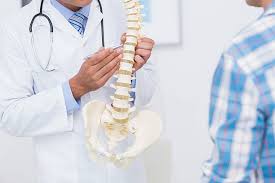Spine-related pain can make it difficult to work, sleep, or follow a routine, as it limits movement and causes discomfort. Such conditions are often caused by structural problems or irritated nerves, which can worsen if left untreated.
Using imaging, mapping nerves, and making precise injections, a pain management Dr can accurately find the source of your pain. When treatment plans are effective, inflammation decreases, function returns, and further symptoms are prevented. Here are three conditions a pain management professional treats:
1. Herniated Disc
Pressure on the nearby spinal nerves can cause pain that radiates down the arms or legs. Some people may notice numbness, tingling, or weakness based on which nerve root is affected. This condition tends to occur when the discs in the spine experience slow strain, injury, or aging.
Doctors use different imaging tests to identify the damaged disc and the associated nerve root. They may use epidural steroid injections to decrease inflammation and ease the symptoms of nerve compression. Non-surgical options are used to improve movement and create a comfortable range of motion. With proper pain control, patients can resume driving, walking, or performing daily chores at home.
2. Spinal Stenosis
The primary causes of the condition include arthritis, bone spurs, or thickened ligaments in the spine. The pain increases when a person is standing or walking and eases when they lean forward or sit down. Imaging and testing allow a pain management dr to locate areas where the spinal cord is being compressed.
Doctors administer anti-inflammatory injections to reduce swelling around the pinched nerves, which immediately relieves some pain. Some specialists recommend physical therapy to help improve posture and strengthen the core muscles. Patients can walk for a longer period without feeling their legs get tired or numb.
3. Degenerative Disc Disease
Degenerative disc disease happens as spinal discs slowly deteriorate with age. As a disc shrinks or becomes dry, it is less likely to absorb shocks, making the spine less flexible. This may lead to pain when you bend, twist, or lift, particularly after a period of prolonged inactivity.
MRI images indicate whether thinning, bulging, or dehydration of discs may be connected to ongoing back pain. Doctors may use therapeutic injections or nerve blocks to reduce pain in specific areas. Exercises that strengthen and improve mobility typically protect the spine and enhance its function.
Schedule a Consultation With a Pain Management Dr
Just because you have back pain doesn’t mean you have to stop moving, working, or being independent. New techniques in pain management are designed to address the underlying problem, not just the symptoms.
If the condition is caused by aging, injury, or wear, getting help early can prevent major issues from developing. Personalized treatment plans can increase the spine’s resistance to future problems. Active professionals or caregivers can use proactive methods to help prevent frequent flare-ups.
By receiving treatment for spine problems sooner, you can get back to your lifestyle. Book an appointment with a pain management dr and begin your path to a healthier, pain-free back.
Related Articles
Why Primary Care Is Key To Managing Preventative Health
Why More People Are Choosing Invisalign for Straightening Teeth





